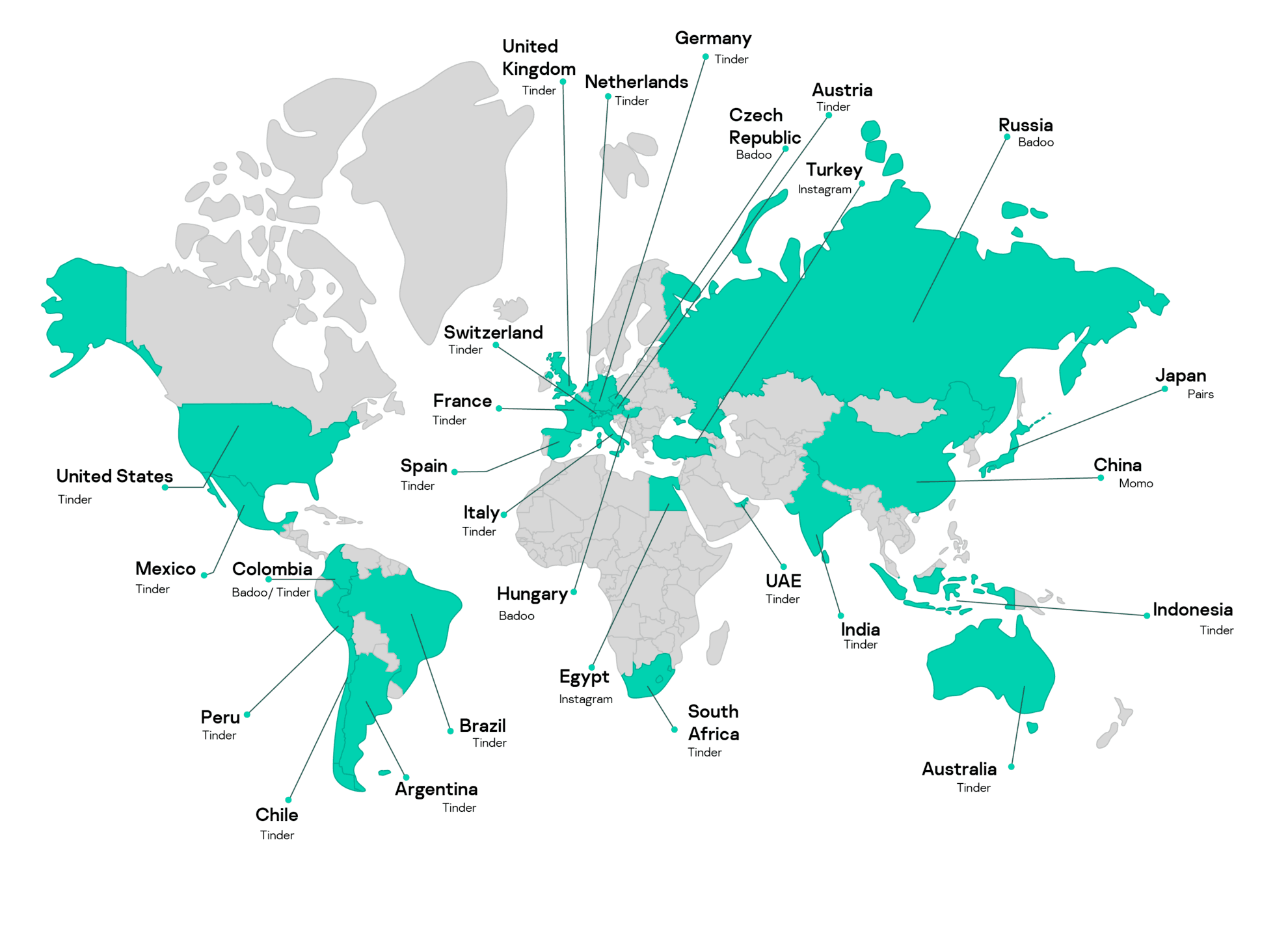A 3-part report about how dating apps have changed the way we meet new people
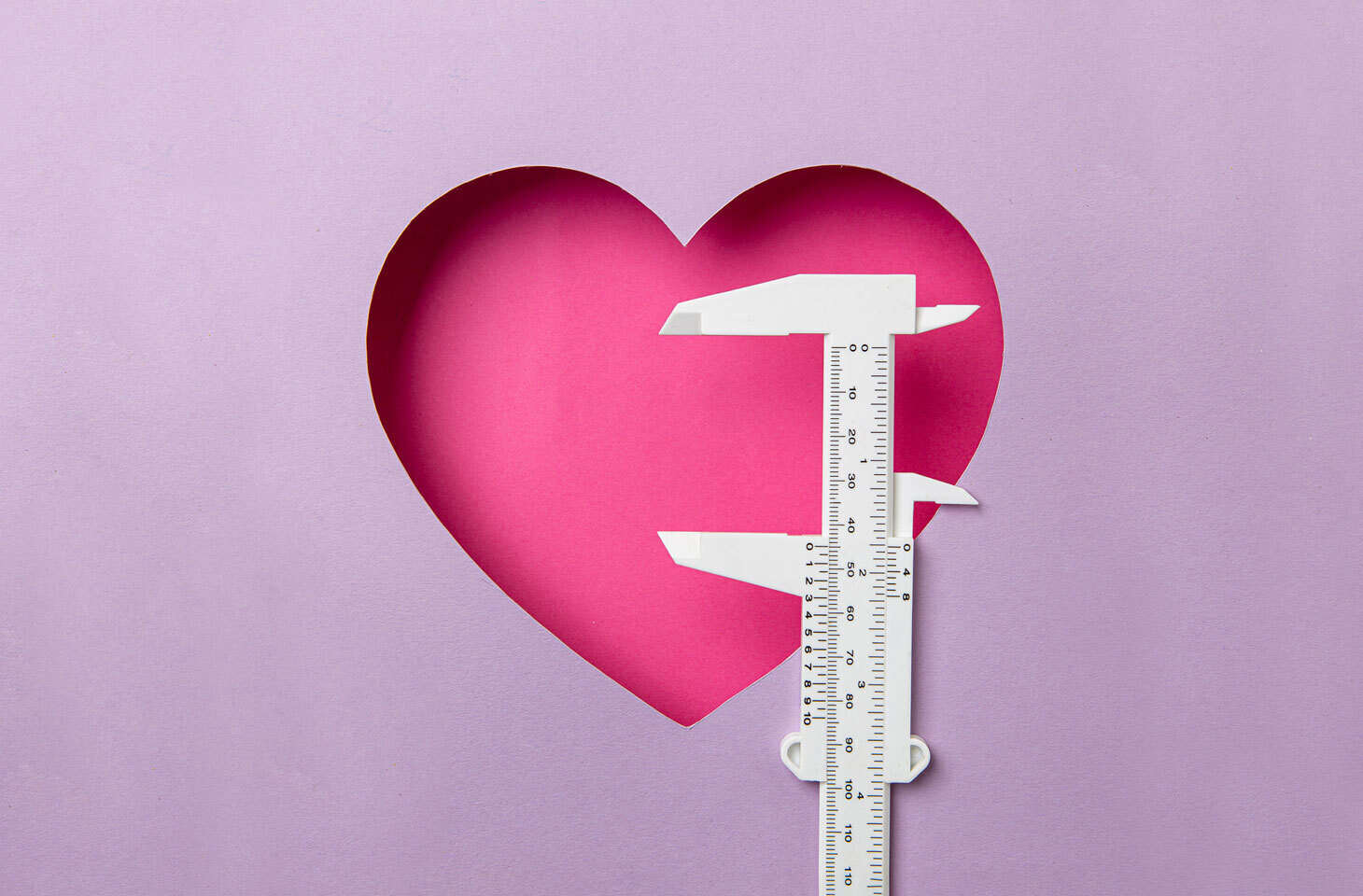
Swiping right on a new culture
No matter their age, sexual orientation or country, people all over the world are now using dating apps to make new friends and find romantic partners.
We surveyed over 18,000 people in 27 countries, of whom 84% were either currently using a dating app (37%) or had used one in the past, to learn more about their experiences.
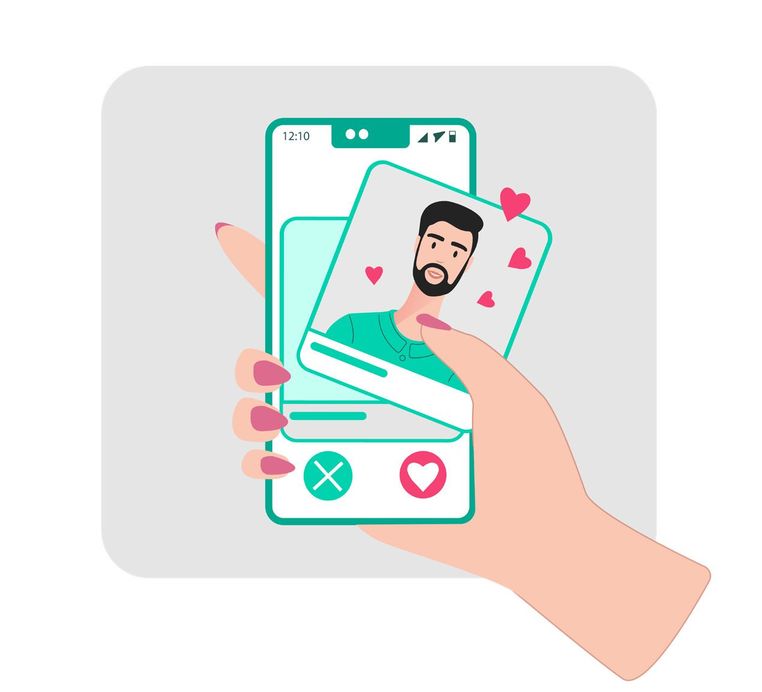 44% of those dating app users feel they actually have to use dating apps in order to date.
44% of those dating app users feel they actually have to use dating apps in order to date.
This massive cultural shift is in full swing at a global scale. And it shows no signs of slowing down.
In fact, 54% agreed that these apps made dating easier and that they enjoyed using them, with 64% saying the suggested matches were good.
But it’s not all champagne and roses.
As millions of people around the world adopt these new technologies, there are also real and severe risks to this new culture of finding people online.
 Users of these apps – in particular 18-24 year olds – are sharing personally identifiable information (53% share their real name) and linking social media accounts to their profiles (25% of people worldwide). In fact, 7% of users were explicitly using dating apps to promote their social media accounts.
Users of these apps – in particular 18-24 year olds – are sharing personally identifiable information (53% share their real name) and linking social media accounts to their profiles (25% of people worldwide). In fact, 7% of users were explicitly using dating apps to promote their social media accounts.
The result is that 65% of our respondents are worried about being scammed on these apps.
And worryingly, 15% reported they’ve already been scammed.
This is a brave new world but it’s also a vulnerable one.
In this 3-part report, we’ll show you what our survey reveals about:
- How people around the world use dating apps today
- How people feel about the role of technology in dating
- How people feel about relationships in this brave new world
Let’s dive in.
About the research
The data presented in this report is based on surveys commissioned by Kaspersky and conducted by Sapio Research in June 2021 among 18,658 people in the UK, US, France, Germany, Spain, Italy, the Netherlands, UAE, Turkey, Egypt, South Africa, China, Japan, India, Australia, Indonesia, Brazil, Argentina, Mexico, Russia, Colombia, Chile, Peru, Austria, Switzerland, the Czech Republic, and Hungary.
This sample includes adults of all ages and sexual orientations.
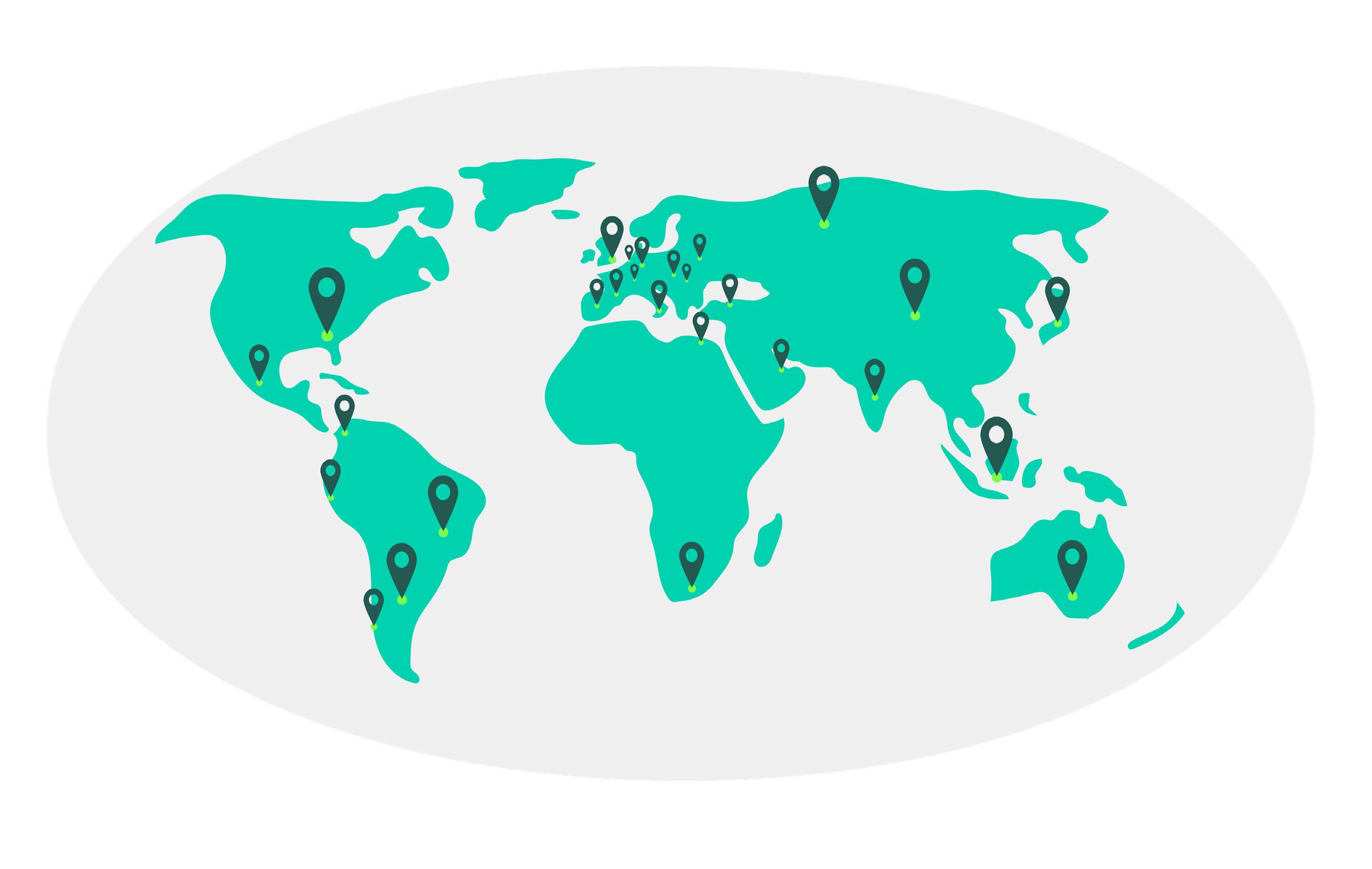
Key findings
- 79% succeeded in promoting their social media on dating apps.
- 48% of people use dating apps to ‘meet new people’ making it the most popular reason.
- 15% of dating app users have been scammed in some way.
- 64% of people felt the algorithm understands their preferences.
- 39% of people believe it’s dehumanizing to be rated by an algorithm.
- 42% of people have would only date people who were vaccinated or had coronavirus antibodies.
Top 3 most popular dating apps by country
Part I: How people around the world use dating apps in 2021
People aren’t only using dating apps for dating.
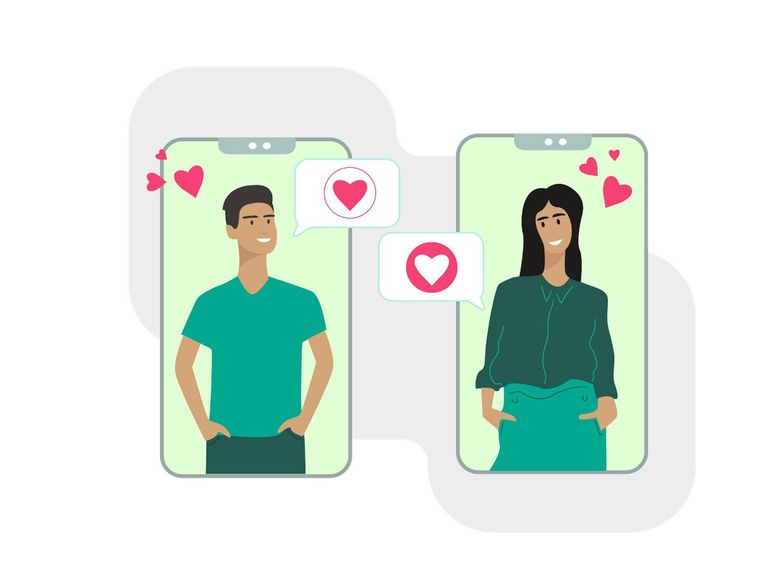 In fact, the top cited reason for using a dating app is to ‘meet and interact with new people’ (48%), with 33% of people saying they use dating apps to make friends.
In fact, the top cited reason for using a dating app is to ‘meet and interact with new people’ (48%), with 33% of people saying they use dating apps to make friends.
Of those looking to meet new people, 64% have been successful. And 70% of people using apps specifically to make friends felt the same way.
Surprisingly, 8% of people worldwide use dating apps to find jobs and networking opportunities with 66% of them saying they’ve even been successful in this context.
Though it’s worth noting this trend is significantly more prominent in certain countries like the UAE (19%), Egypt (18%), China (23%), India (15%) and Indonesia (21%).
How successful have you been in achieving
these aims on dating apps?
Dating apps aren’t just for short-term relationships.
More than a third of people using dating apps are looking for a significant relationship.
In fact, behind ‘meeting new people’, the second-most popular reason people use dating apps is to seek out a long-term relationship (41%). However, only 37% of these respondents said they had been successful so far. So even though it’s a popular goal for users, it’s still the hardest to achieve.
Meanwhile of the 24% who were looking for emotional intimacy, an encouraging 54% said they were successful in finding it. On the other hand, 27% used dating apps to find a sexual partner and 23% stated they were looking for a shorter-term, casual relationship. And more than 60% of people looking for these kinds of relationships were successful thanks to dating apps.
Looking a little closer, there is a disparity in goals between genders. While only 15% of women are using dating apps to find a sexual partner, 37% of men are using it for precisely that reason. Similarly, while 17% of women are looking for a short-term relationship as many as 28% of men use dating apps for that reason.
Fortunately, when it comes to long-term relationships there’s a lot more balance with 40% of men and 42% of women stating that’s why they use dating apps.
But not everyone’s enjoying themselves on dating apps.
51% of people who’ve never used a dating app say it’s because they prefer meeting people in person. But far more concerning is how many people don’t use dating apps because they fear severe negative consequences.
38% are concerned about being scammed, 34% don’t trust people on dating apps and 12% have friends who’ve had bad experiences. 3% feel they’re too vulnerable because of their sexual orientation.
Even looking at people who do use dating apps, a similar theme emerges.
When asked what they dislike about online dating apps, our respondents cited fake profiles (53%), concerns around sharing personal information (26%) and contact from scammers (21%).
Worryingly, 20% have received rude and inappropriate messages while 6% feel their sexual orientation makes them more vulnerable.
Looking at people who dislike and even delete dating apps because of concerns like these, there’s a clear difference in patterns across genders.
31% of those who disliked apps because of rude messages were women, 22% identified as non-binary and 31% were transgender. Meanwhile only 10% were men. Similarly, 28% of people who deleted apps because someone made them uncomfortable were women, 40% were non-binary and 26% were transgender, while only 14% were men.
For some men, one of the primary concerns with dating apps appears to be around not receiving enough attention. Of the 27% of respondents who deleted a dating app because they didn’t receive enough attention, 37% were men and only 16% were women.
Fears extend to the real world
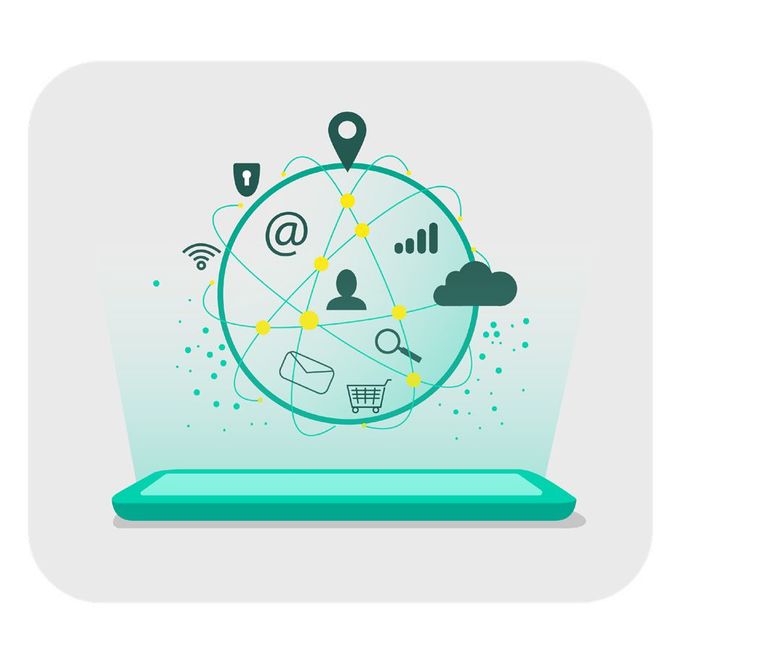 When asked why they wouldn’t meet someone in person rather than online, 38% of people said it was because they wanted to get to know someone before they met them.
When asked why they wouldn’t meet someone in person rather than online, 38% of people said it was because they wanted to get to know someone before they met them.
Culture plays a big role as this percentage varies by country with, for instance, 55% of Indonesians feeling this way compared to just 27% of Hungarians stating the same. At the same time, given this is about safety, it may be no surprise to see 41% of women feeling this way though 35% of men feel the same.
33% said they preferred meeting online first because they’re afraid of rejection and 30% stated they were too embarrassed to start a conversation with a stranger. Understandably, 35% of 18-24 year olds share this concern while only 18% of those older than 65 have this fear.
How were you targeted for scamming?
Scammers loom large.
 Our survey finds that 15% of people who use dating apps have been scammed through them. 31% weren’t scammed but have been contacted by scammers.
Our survey finds that 15% of people who use dating apps have been scammed through them. 31% weren’t scammed but have been contacted by scammers.
Looking closer at the nature of fraud on these platforms, catfishing is the number one tactic with 51% of those targeted for scamming subject to it.
In 21% of these cases, the scammer sent the user a link or an attachment. While in 29% of cases the user’s identity was stolen.
15% of these people were blackmailed while, unfortunately, in 40% of cases they sent the scammer money (as a gift, for an injury or to pay for travel so they could ‘meet’). Even worse, 55-64 year olds were most likely to send a fraudster money for travel, representing 20% of cases.
Stalking, doxing and other threats
16% of our respondents say they’ve been doxed because of dating apps (though only 5% knew that that’s what it’s called). And 19% say they know someone who’s been doxed.
What’s concerning is how vulnerable users really are to a litany of threats when using these apps. 17% were stalked on social media by someone they didn’t match with.
12% reported that someone publicly shared a private conversation they’d had with someone they’d matched with.
9% were stalked in real life by someone they didn’t match with and 8% had intimate photos of theirs ‘leaked’ online.
Education could prove invaluable.
While the threat of scammers and other bad actors shouldn’t be underestimated and the damage they cause is all too real to victims, there may be some hope to be gained from those who’ve been contacted by scammers but not given in.
50% of these users said the profile looked fake and 47% said the message seemed auto-generated. While 49% of them stated they never send money on dating apps and 31% of them never share personal information.
 In fact, 21% became suspicious when the scammer refused a video call.
In fact, 21% became suspicious when the scammer refused a video call.
This suggests that educating users how to spot fake profiles, what to do when they’re dealing with someone suspicious and what not to do when dealing with strangers online may prove key in the fight against these criminals.
Part II: How people feel about the role of technology in dating
 54% of people who use dating apps believe the apps make dating easier and enjoy using them with 64% stating the suggested matches are good for them.
54% of people who use dating apps believe the apps make dating easier and enjoy using them with 64% stating the suggested matches are good for them.
So it’s fair to say that over time, these apps have proven they can be reasonably successful in the various ways people use them.
But it’s important to note how much faith – and crucially, data – we’re investing in these apps as well.
A fear of sharing personal information
79% of people who use dating apps are revealing at least their actual age with 53% of people making their real name available on the apps.
Worryingly, it’s both the youngest and oldest people who may be at risk. 62% of 18-24 year olds and 40% of those older than 65 share their real names online. While 38% of 18-24 year olds and 62% of people over 65 are sharing their location online.
As previously described, there are a number of ways in which scammers and fraudsters can take advantage of this situation.
For instance, 76% of those who link their dating app profile to social media connect their Instagram accounts to their dating profiles with 58% doing the same for their Facebook profiles. Snapchat and Twitter profiles were both connected by 31% of respondents.
(The older someone is the likelier they are to be connecting their Facebook profile and the younger they are, the likelier they are to be connecting their Instagram and/or Snapchat.)
The danger of online threats isn’t lost on users of dating apps though. 50% of all users feel nervous when they meet someone they met online for the first time (naturally). But 18% report feeling unsafe.
In fact, 65% state they’re afraid of being scammed, 55% are afraid of being stalked online and 54% are afraid of being stalked in real life.
It’s worth noting that 45% of men are afraid of being stalked in real life but 64% of women share the same fear.
What, if any, other social media or online accounts are / were connected to or linked to on your dating app profile?
Select all that apply
Mixed feelings about the role of the ‘algorithm’
64% of people felt the algorithm understands their preferences with 69% of 18-24 year olds in particular feeling this way.
44% of respondents said they would trust AI or an algorithm to find them a compatible match.
And 43% went so far as to say they prefer to only see people who have been determined to be a good match by an algorithm.
Yet on the other hand, 39% find it ‘dehumanizing’ to be sorted by an algorithm while 56% don’t believe an algorithm can truly capture the complexity needed to understand attraction.
In fact, 58% of people state they’d rather have equal access to everyone on an app than have an algorithm sort people for them.
So, while there’s no doubt about the mass adoption of these stats, it’s fair to say users are still split on how good they are for us in the long run and even how effective they are right now.
30% of respondents felt that dating apps made it easier to start dating but made the subsequent process far more complicated.
Dating since the pandemic
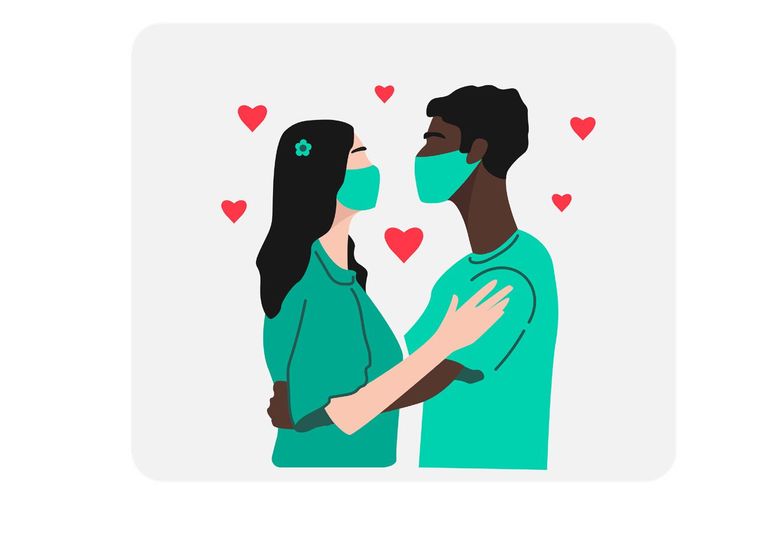 The pandemic changed a lot about dating and meeting people.
The pandemic changed a lot about dating and meeting people.
A big part of the cause for that is undoubtedly people’s concerns over their physical health and safety. In fact, 42% of people have gone so far as to say they would only date people who were vaccinated or who had coronavirus antibodies.
Can new social conventions beget smarter apps?
The prevalence of dating apps has, in some critical ways, made dating a lot safer for people. For instance, 72% of people stated they prefer a video or phone call before meeting someone they’ve met online, in person.
And most users who decide to meet someone in person do so within the first 2 weeks (59%) with a further 25% of people meeting within the first month.
In this context, apps help enforce an important social convention for those interacting on the web – users can filter for fraudsters and scammers themselves, to some extent, by insisting on a phone or video call before meeting.
Not only would this reduce the number of times scammers get closer to victims. 62% of respondents also stated that their preference is to only be contacted by people they’ve already shown an interest in.
As apps hone their algorithms to find better matches, this may be another way in which app design can keep users safe and happy.
What about virtual companions?
On the lighter side of things, 27% of respondents actually predicted that in the future people wouldn’t be able to tell the difference between a real person and AI.
55% of respondents stated they would not consider being in a relationship with a virtual AI companion while 14% stated they would consider it. 23% responded ‘maybe’.
Curiously, 8% stated they had already been in a relationship with one and would consider it again.
III: How people feel about relationships in an algorithmic age
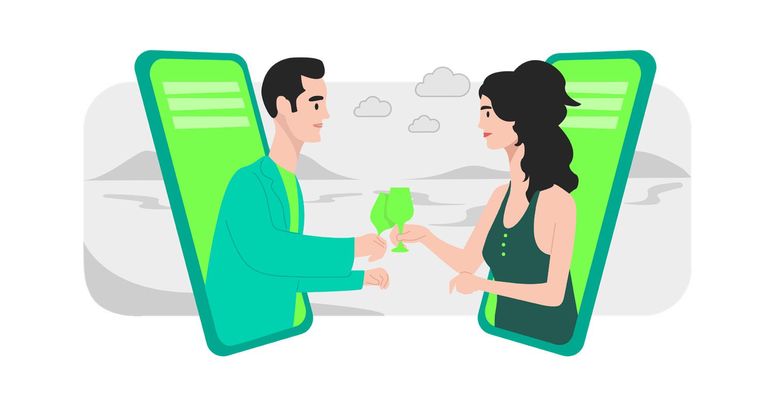 As more people use apps to meet new people, this technology starts to have a fundamental impact on the nature of human relationships themselves.
As more people use apps to meet new people, this technology starts to have a fundamental impact on the nature of human relationships themselves.
Here are some of the ways people perceive dating apps changing relationships.
The perceived decline of monogamy
41% of our respondents feel dating apps have led to the increase of casual relationships with 37% believing people are more likely to be talking to several prospective partners at the same time.
21% believe apps have increased non-monogamy and 27% think people will now have more relationships in their lifetime than they used to while 21% think people will spend less time being single now.
Conversely, 34% of people actually predict that people will find it easier to leave relationships because of dating apps.
The perceived rise of superficiality
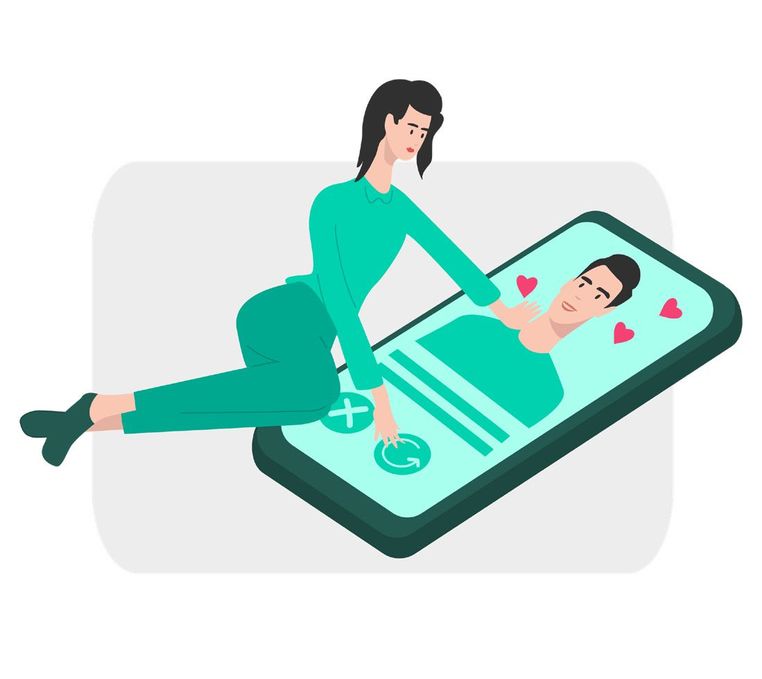 29% of people believe dating apps encourage people to be more superficial. Related to the perceived decline of monogamy, 26% of our respondents believe that others are now less likely to invest in relationships because of dating apps.
29% of people believe dating apps encourage people to be more superficial. Related to the perceived decline of monogamy, 26% of our respondents believe that others are now less likely to invest in relationships because of dating apps.
Although given the dangers we’ve previously discussed, it’s also likely a lot of this behavior is simply down to fear.
23% of our respondents believe that people are likelier to be scared of meeting someone offline now. And 19% believe people are less likely to pursue relationships if they first met the other person offline.
Looking forward
When asked how dating apps will change relationships over the next 30 years, respondents predicted a continuation of a lot of the trends we already see today.
35% feel that apps will be the way most people meet their partners in the future.
14% believe it will become inappropriate to even pursue relationships in person, suggesting that social norms and etiquette will continue to evolve in a way that accommodates apps as the primary channel for dating.
Most hopefully, 33% of people believe that dating apps will ensure more people from different backgrounds find each other. And another 33% anticipate a rise in purely online relationships.
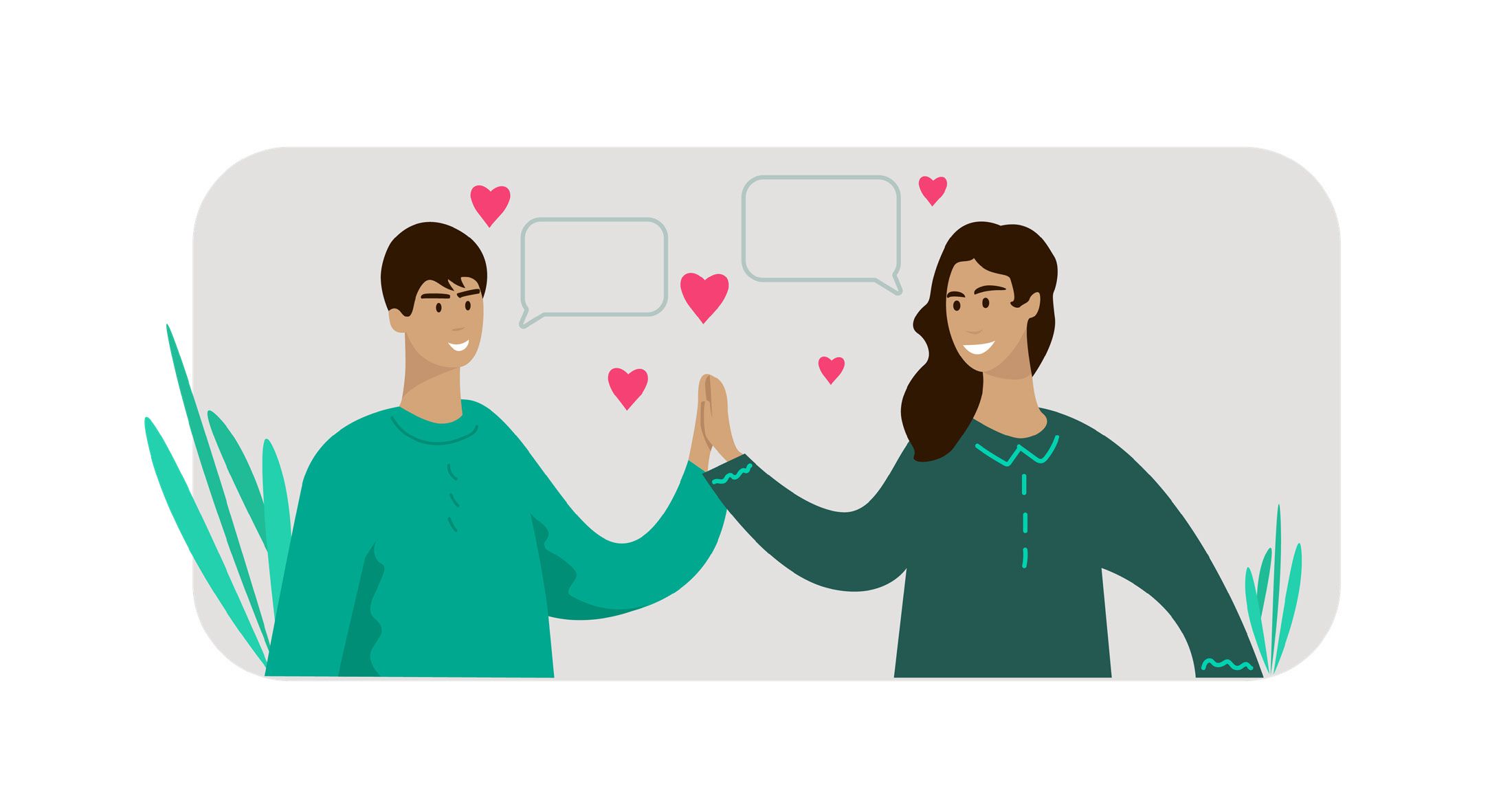
A new frontier for love
At this stage there can be little doubt that dating apps have become one of the most important ways for people to make new relationships. Only 28% of people believe you don’t have to use dating apps to date.
At the same time, it’s important to be cognizant of the very real threats these technologies inadvertently bring with them.
In the immediate term, keeping people safe has to be the priority. Both for users themselves and the businesses behind these hugely popular technologies.
In the longer term, it’s also worth keeping an eye on how we as people are adapting to these technologies as well.
32% of people believe dating algorithms will become more sophisticated and accurate. At the same time, 39% of people believe it’s dehumanizing to be rated by an algorithm in the first place. And 56% feel that algorithms can’t capture the complexity of what it takes to attract one person to another.
What’s clear is that dating apps have given millions and millions of users the world over the ability to meet new people and forge new relationships in a way humans have never known before.
But it’s also clear that many need education on dealing with strangers online and over time, these businesses need to hone their anti-fraud capabilities as much as their algorithms.
This is a brave new world but it doesn’t have to be a vulnerable one.
With better education for users, significantly better anti-fraud protocols and new social conventions that enable people to protect themselves, dating apps can establish themselves as both the most popular and the safest way for people to find love in the 21st century.
About Kaspersky
Kaspersky is a global cybersecurity and digital privacy company founded in 1997. Kaspersky’s deep threat intelligence and security expertise is constantly transforming into innovative security solutions and services to protect businesses, critical infrastructure, governments and consumers around the globe. The company’s comprehensive security portfolio includes leading endpoint protection and a number of specialized security solutions and services to fight sophisticated and evolving digital threats. Over 400 million users are protected by Kaspersky technologies and we help 240,000 corporate clients protect what matters most to them. Learn more at www.kaspersky.com.
